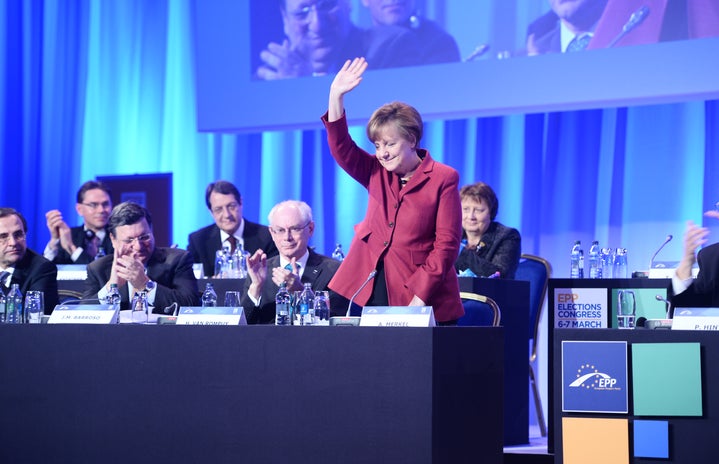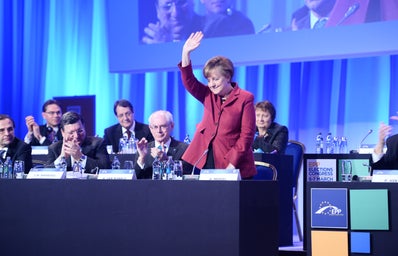Reflecting on the legacy of a 16 year-long Chancellor in her last week in office, an undeniable figure of stability and trust.
It is hard to know what to say, when contemplating the end of a term in office which spanned over one and a half decades. This is not just in relation to the sheer duration of her time in power, but because Merkel – her leadership style, her personal values, her international positioning – remains a mystery. Not without reason has she been given diametrically opposite nicknames in headlines: ‘Ice queen’, ‘Mutti’ (Mummy), ‘Merkiavelli’ …
In August, Niall Ferguson released a scathing report on the German Chancellor, which portrayed a rather melancholy narrative of the country itself. He paints Germany as tired, with an ageing population, a lacklustre [GM2] [LM3] cultural scene, and a failing football team. At its centre, he writes, is the leader who has ‘all but brought German history to a halt’, criticizing everything from her lack of strategic vision to her ‘frumpy’ appearance. However, whilst Merkel has always faced legitimate criticism for her inactivity and lack of foresight, Ferguson crucially fails to recognize her quiet accomplishments. In fact, it is precisely her humility, her steadfastness, which so endears her to the German public, despite divided judgements on her leadership.
‘Unprecedented’ is a term frequently used to describe the key events of the last 16 years. It encompasses everything from the Financial Crisis, and subsequent Eurozone crisis, the European refugee crisis, a pandemic, to this summer’s flooding, which constitutes the deadliest natural disaster in Germany in 60 years. Yet, in what was arguably the most turbulent period the country has experienced since the Second World War, I grew up in a country renowned for its stability and efficiency. At its helm, Merkel weathered the changes with (generally) comforting composure.
However, this image itself is riddled with contradictions. Most notably, when she faced criticism for her stiff attempts at comforting a young Palestinian refugee as she maintained the need to limit the number of refugees in Europe – politics are ‘tough’, she offered as explanation. Then, a mere six weeks later, she opened Germany’s borders, famously declaring: ‘We can make it’. In 2015 and 2016, Germany took in roughly 1.2 million asylum seekers, and for her opponents, Merkel’s declaration came to epitomize the failings of her immigration policies. The response to the migration crisis is ultimately linked with the rise of German right-wing violence, growing support for the right-wing populist party, AfD, and, to a certain extent, contributed to the Brexit debates (with a significant number of British voters eager to a possible influx of immigrants).
For others, however, her statement represented a culture of open acceptance, of hospitality, and a chance at redemption. The statement has developed power to an extent that Merkel herself has taken a step back from those words, explaining that too much promise had been set by them.
I think her words suit her legacy, which Dr Katrin Schreiter, lecturer in German and European studies at KCL, summarises as ‘determined’: ‘Her leadership is based on sober evaluation and projecting reliability.’ The Chancellor’s words offered hope to millions, and, somewhat ironically, she came to represent a ‘friendly face’: ‘If we now start having to apologize for showing a friendly face in a situation of need, then this is not my country.’
What is clear is that Merkel leaves behind a ‘contested legacy’; declared as the most powerful woman in the world for 10 years in a row by Forbes, there is an entire ‘generation in Germany that has never known anything other than a woman leader‘. Until 2020, her legacy’s defining elements might have more clearly been her position as a defender of an open Europe. Now, with German Covid cases exploding in a fourth wave, perhaps it is her political style of deliberation and hesitation that will be remembered.
Yet as Merkel prepares to leave office this week, she continues to enforce a message of solidarity and trust. In a ceremonial military farewell last week – the highest military honor a civilian can receive – Merkel spoke against hatred and violence, reaffirming the need to support scientific evidence. She spoke of gratitude, and of honour, and, with her characteristic collectedness, reminded the country to defend ‘politics, science and societal discourse’ – essentially, a reminder to maintain what her very existence embodies: stability, and democracy, in the face of all crises.


